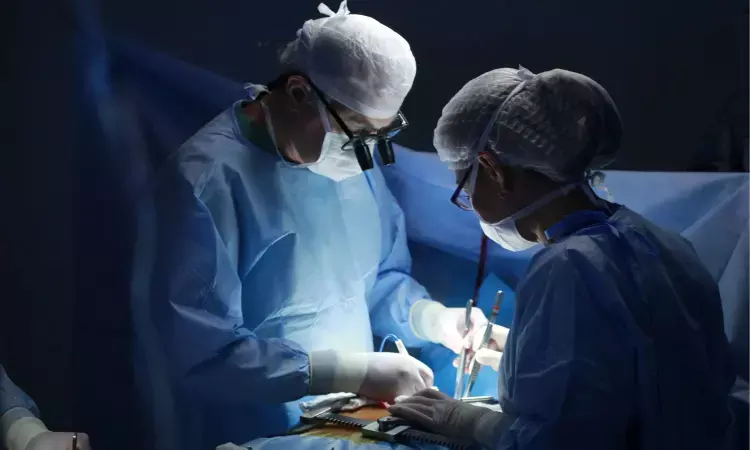- Home
- Medical news & Guidelines
- Anesthesiology
- Cardiology and CTVS
- Critical Care
- Dentistry
- Dermatology
- Diabetes and Endocrinology
- ENT
- Gastroenterology
- Medicine
- Nephrology
- Neurology
- Obstretics-Gynaecology
- Oncology
- Ophthalmology
- Orthopaedics
- Pediatrics-Neonatology
- Psychiatry
- Pulmonology
- Radiology
- Surgery
- Urology
- Laboratory Medicine
- Diet
- Nursing
- Paramedical
- Physiotherapy
- Health news
- Fact Check
- Bone Health Fact Check
- Brain Health Fact Check
- Cancer Related Fact Check
- Child Care Fact Check
- Dental and oral health fact check
- Diabetes and metabolic health fact check
- Diet and Nutrition Fact Check
- Eye and ENT Care Fact Check
- Fitness fact check
- Gut health fact check
- Heart health fact check
- Kidney health fact check
- Medical education fact check
- Men's health fact check
- Respiratory fact check
- Skin and hair care fact check
- Vaccine and Immunization fact check
- Women's health fact check
- AYUSH
- State News
- Andaman and Nicobar Islands
- Andhra Pradesh
- Arunachal Pradesh
- Assam
- Bihar
- Chandigarh
- Chattisgarh
- Dadra and Nagar Haveli
- Daman and Diu
- Delhi
- Goa
- Gujarat
- Haryana
- Himachal Pradesh
- Jammu & Kashmir
- Jharkhand
- Karnataka
- Kerala
- Ladakh
- Lakshadweep
- Madhya Pradesh
- Maharashtra
- Manipur
- Meghalaya
- Mizoram
- Nagaland
- Odisha
- Puducherry
- Punjab
- Rajasthan
- Sikkim
- Tamil Nadu
- Telangana
- Tripura
- Uttar Pradesh
- Uttrakhand
- West Bengal
- Medical Education
- Industry
Bypass surgery addition to medical therapy fails to impact stroke outcome or death risk in Patients With Symptomatic Artery Occlusion

Dr Yan Ma recently said the addition of bypass surgery to medical therapy, vs. medical therapy alone, did not significantly change the risks of the composite outcome of stroke or death within 30 days or ipsilateral ischemic stroke beyond 30 days through 2 years. This Original Investigation, “Extracranial-Intracranial Bypass and Risk of Stroke and Death in Patients With Symptomatic Artery OcclusionThe CMOSS Randomized Clinical Trial,” was published in JAMA.
Previous attempts at EC-IC bypass surgery were unsuccessful in preventing stroke in patients with atherosclerotic occlusion in the internal carotid artery or middle cerebral artery. However, advancements in surgical methods and patient selection have since been made.
The main question is, among symptomatic patients with atherosclerotic occlusion of the internal carotid artery (ICA) or middle cerebral artery (MCA), does extracranial-intracranial bypass surgery plus medical therapy reduce stroke or death vs. medical therapy alone?
This was studied at 13 centres in China among the study population of 257 men and 67 women; these adults of mean age 52 years had ICA or MCA occlusion with a transient ischemic attack or non-disabling ischemic stroke.
In the intervention, 330 patients were randomized, and 324 were analyzed. One hundred sixty-one were in the surgical group, including extracranial-intracranial bypass surgery and medical therapy. One hundred sixty-three were included in the medical group, including antiplatelet therapy and stroke risk factor control.
The primary outcome included a composite of stroke or death within 30 days or ipsilateral ischemic stroke beyond 30 days through 2 years after randomization.
The composite primary outcome achieved in the surgical group and the medical group was 8.6 % and 12.3 %, respectively in 13 patients and 19 patients with an incident difference of -3.6 % with a hazard ratio of 0.71
They said the findings do not support the addition of EC-IC bypass surgery to medical therapy for treating symptomatic atherosclerotic occlusion of the ICA or MCA.
Further reading:
Ma Y, Wang T, Wang H, et al. Extracranial-Intracranial Bypass and Risk of Stroke and Death in Patients With Symptomatic Artery Occlusion: The CMOSS Randomized Clinical Trial. JAMA. 2023;330(8):704–714. doi:10.1001/jama.2023.13390
BDS, MDS in Periodontics and Implantology
Dr. Aditi Yadav is a BDS, MDS in Periodontics and Implantology. She has a clinical experience of 5 years as a laser dental surgeon. She also has a Diploma in clinical research and pharmacovigilance and is a Certified data scientist. She is currently working as a content developer in e-health services. Dr. Yadav has a keen interest in Medical Journalism and is actively involved in Medical Research writing.
Dr Kamal Kant Kohli-MBBS, DTCD- a chest specialist with more than 30 years of practice and a flair for writing clinical articles, Dr Kamal Kant Kohli joined Medical Dialogues as a Chief Editor of Medical News. Besides writing articles, as an editor, he proofreads and verifies all the medical content published on Medical Dialogues including those coming from journals, studies,medical conferences,guidelines etc. Email: drkohli@medicaldialogues.in. Contact no. 011-43720751


